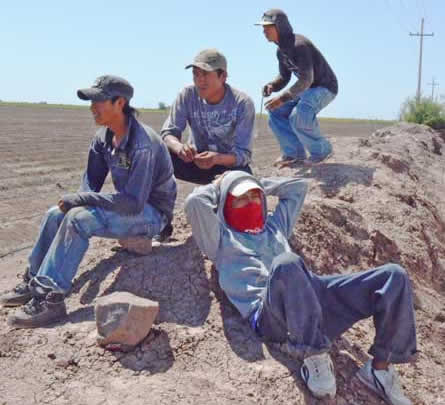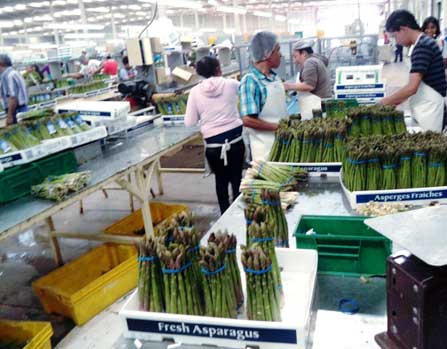Agrochemicals in Yaqui Valley threaten farm workers, fields and consumers

Laborers wait for the employee bus at the end of the day. (Photo: Alfredo Acedo).
CIUDAD OBREGÓN
At Campo Bórquez in the municipality of Bacum, farm workers from southern Mexico toil to make a living for themselves and their families in the cultivation of asparagus, a crop destined for export. However, year after year they are exposed to pesticides because the neighboring wheat farmer uses chemicals that are harmful on contact with eyes and skin.
"They fumigate right next to us," says agronomist Francisco García, manager of operations and control at La Realidad packing company. "We don't know what they are using."
Around 1,000 people work on the 5,000 metric tons of asparagus harvested annually from the nearly 10,000 hectares under cultivation on this Yaqui Valley farm.
The company provides both medical and economic benefits. They offer optical and orthodontic services. They operate a small general health clinic and have a computer room that is open to workers and their families. There is even a baseball team and judo.
The beneficiaries of all of this don't have any idea how much risk to their health or their families future they face. Nor does anyone know how much the chemicals from next door affect the exported crop.

Workers at the Campos Borquez packing company wash and box asparagus. (Photo: Alfredo Acedo).
"If they aren't careful with the pesticides next door, they can affect the asparagus farms and in turn the consumer," claims researcher Alfredo Acedo.
A large sign in the neighboring field says "Malathion", announcing the use of a chemical classified by 400 member organizations of the Red de Acción en Plaguicidas (Pesticide Action Network) as among the top "worst 20" because they are especially harmful to children.
According to the Network, it can affect the brain and nervous system, cause respiratory tract irritation, impact reproduction and development, contribute to obesity and diabetes, as well as cancer in children.
García emphasizes that the incidence of cancer in the Yaqui Valley is high because of the amount of agrochemicals used, including many of those banned in other places.
